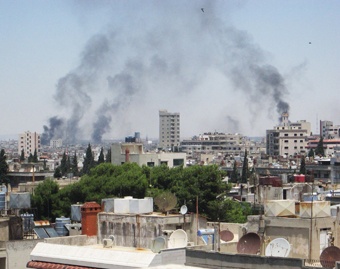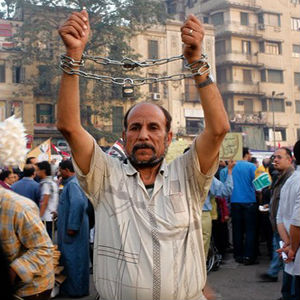
.- Fighting in Syria continues to put pressure on the minority Christian population, leading to fears that more Syrians will join the many Christians who have already left the Middle East. Journalist Nasir Habish told Vatican Radio that Syria’s Christians are among those most affected by the conflict between rebel and government forces. “The Syrian situation, right now, is very difficult, and I think in the future will be more difficult,” Habish said. “And I think the war will continue.” He said Christians are “running away from Syria right now,” with many refugees fleeing to Lebanon and most proceeding to Europe. “We don’t want to lose the Christianity in the Arab region,” he said. “This is the land of Jesus. I can’t imagine the land of Jesus without Christians.” The United Nations has said that more than 60,000 people have died in the conflict. The latest fighting includes a repelled rebel attack around the Taftanaz airbase in the northwestern province of Idlib. Government forces are seeking to recapture the Damascus suburb of Daraya, which hundreds of rebel fighters have held for weeks. Pro-government newspapers report that the latest offensive on Daraya inflicted heavy losses on the rebels, the Associated Press says. The uprising against President Bashar Assad began in March 2011. More than half a million Syrians have become refugees.
The United States has been providing clandestine support for the rebels for months. On Dec. 11, President Barack Obama joined France and Britain in recognizing the rebel coalition, calling it “the legitimate representative of the Syrian people.” The conflict has some sectarian aspects. Rebels tend to be Sunni Muslims, the majority religion in Syria. President Bashar’s government is mainly Alawite, a minority Muslim group. The government has support from some Sunnis and many religious minorities, including many Christians who make up only 10 percent of the population. Many Christians in the region fear Syria will become another Iraq, where poor security after the U.S. invasion in 2003 has allowed militant Islamic groups to target Christians for intimidation, killings and kidnappings that helped drive hundreds of thousands of Christians out of the country. Sister Agnes-Mariam de la Croix, mother superior of the Greek Catholic Monastery of St James the Mutilated in Syria, has charged that the Syrian uprising has been “hijacked by Islamist mercenaries who are more interested in fighting a holy war than in changing the government.” She said the conflict has turned into “a sectarian conflict” in which Christians are “paying a high price,” the Daily Mail reports. She said at least 80,000 Christians have been forced from their homes in the Homs region. Over 300,000 Christian Syrians are believed to be refugees.
1. President Harry Truman is believed to be the first sitting president to use the modern autopen reguarly. eBay even had a Truman signed thank-you-note for sale, as Gawker noted. But Time Magazine said President Thomas Jefferson was a fan of the polygraph, a new invention at the time that recorded his signature. 2. […]

KNOXVILLE, TN (Catholic Online) – America’s children (and many parents) woke up bleary-eyed Christmas morning in excited anticipation of colorfully wrapped presents waiting for them under the Christmas tree. But it was not so joyful in many places throughout the world. In some Muslim countries, Christians are afraid to openly celebrate their faith; in others, they do so reservedly. It was a mixed bag for the Coptic Christians of Egypt this year. Their new government stuffed an Islamist-based constitution in their stockings. This New Year’s Eve, people around the world will celebrate the coming year in hope of a new and better future. But the Copts will pray that they will be able to live in freedom from persecution and celebrate Christmas in peace next year.
The controversy surrounding Egypt’s new constitution goes back to April of this year, when the General Council for the Coptic Orthodox Church unanimously decided to withdraw from talks on the constitution. Shortly thereafter committee members from the Coptic Catholic Church and the Protestant Christian community followed. But it was not just Christians who were frustrated by the Islamists. Many members from Egypt’s secular parties also pulled out of the talks for the same reason. The reason for these pullouts was that the drafting committee for writing Egypt’s new constitution was dominated by Islamists. Christians and liberal Muslims believed the committee should represent the nation’s diversity, but Islamists said it should reflect the composition of parliament. Islamist groups made sweeping victories in the recent parliamentary elections, and they claimed that their victories gave them a mandate to Islamize Egypt.
The Muslim Brotherhood was the biggest winner. They secured approximately 47 percent of the available seats in the lower house. The Salafis came in second with about 25 percent. Both Islamist groups, the Muslim Brotherhood and the Salafis, did almost as well in the upper house. However, a court did not agree that they had a mandate to Islamize the country. Consequently, the court dissolved the committee charged with writing Egypt’s new constitution, or at least they attempted to dissolve it. In November, President Morsi responded to the delays surrounding the drafting of the constitution. In an effort to hold a referendum on a new constitution before the end of the year, he issued a declaration giving himself sweeping, dictatorial-style power. President Morsi thereby banned all challenges to his decrees and decisions. He also declared that no court could dissolve the committee drafting the constitution, and he fired the head of the judiciary.
The President’s actions unleashed a firestorm. A group of judges said, "The state of law is at stake." The Vice-President of the Supreme Constitutional Court, Tahani al-Gebali, said that Morsi was now an "illegitimate president." And Mohamed ElBaradei, a Nobel Peace Prize winner, said, "Morsi today usurped all state powers and appointed himself Egypt’s new pharaoh." Some protestors trashed the offices of the Freedom and Justice Party and the Muslim Brotherhood. President Morsi was forced to flee for his safety as protestors marched on the presidential palace in Cairo and clashed with supporters of the Muslim Brotherhood. At one point, an estimated 200,000 protestors flooded into Cairo’s famous Tahrir Square, the home of the Egyptian revolution two years ago.
Pretty much everyone has a preference between Coke and Pepsi, even though most people can’t tell the difference. So what is the difference? "Pepsi is sweeter than Coke, so right away it had a big advantage in a sip test. Pepsi is also characterized by a citrusy flavor burst, unlike the more raisiny-vanilla taste of […]



